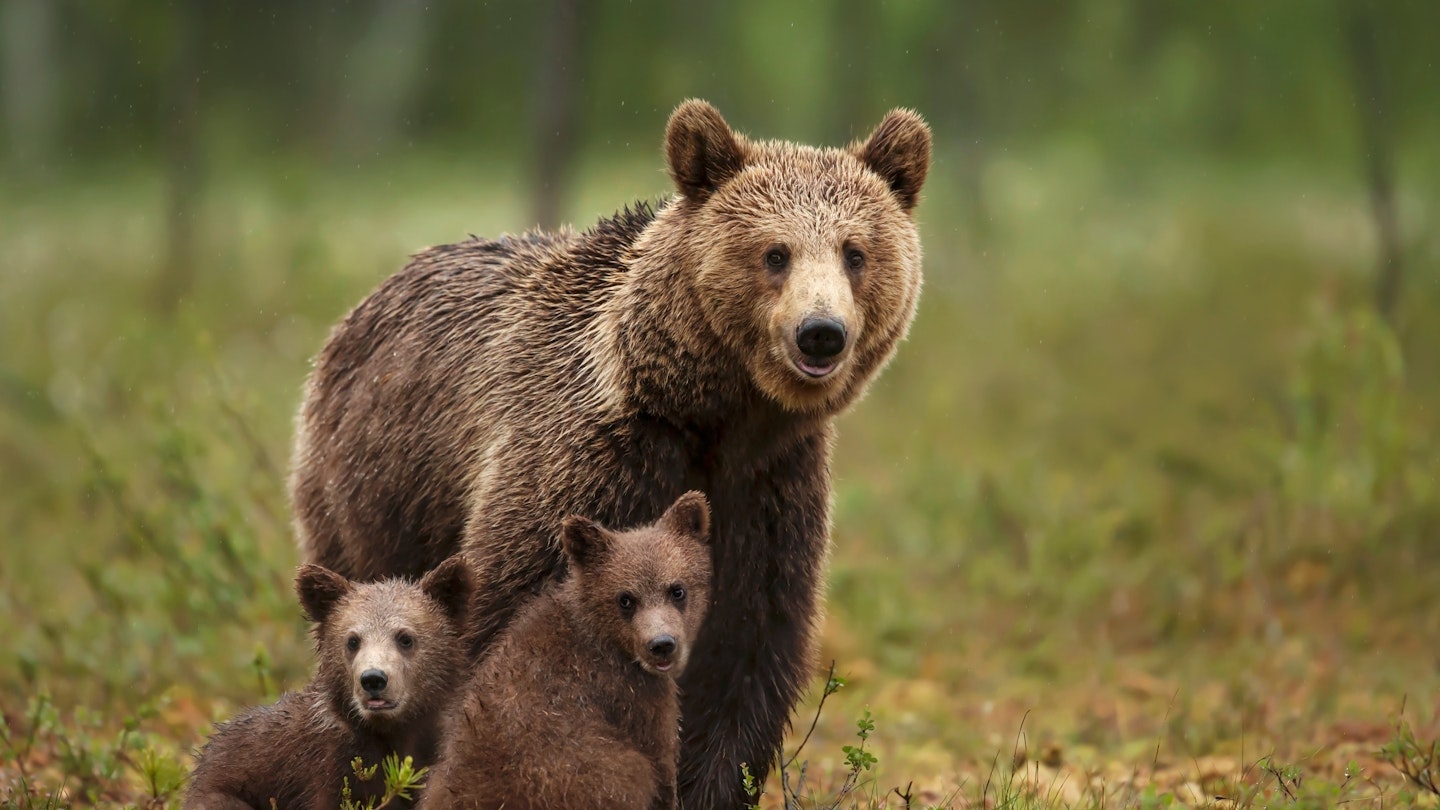Experience Finland’s Unique Wildlife
Much of Finland snuggles under a blanket of dense, wild forest, providing habitats for diverse and magnificent species. The upshot is that the wildlife here is way up there with Europe’s best: you can spot bears, wolves, and wolverines from remote hides, immerse yourself in Sámi reindeer herding life, or go husky sledding in the Arctic. Moreover, these experiences are ethical, as the Finns are remarkably in tune with nature. Here’s a glimpse of some fascinating wildlife adventures.
Brown Bear Watching
As spring melts into summer, the remote solitude of the country’s old-growth boreal forests and swamps beckons. Spend the night in the company of brown bears at a conservation-focused nature reserve in Lentiira, where eastern Finland slips unobserved into the wilds of Russia.
The forests here are so unnervingly silent that you are aware of your own heartbeat, every rustle in the ferny undergrowth, and, perhaps, eyes hungrily watching you. However, the brown bears are not aggressive like their grizzly cousins. You’ll be captivated when a bear approaches your hide, close enough to hear its raspy snuffles. Witnessing a bear lift itself onto its hind legs is sheer magic.
Spring adds bouncy cubs into the equation, and seeing them play in the cottongrass-stippled swamps feels like a scene from a storybook. If lucky, you’ll spot other wildlife, including wolverines, wolves, lynx, and elk. Consider joining a group and guide within communal hides or, for photographers, opt for a solo hide during the white nights of midsummer for unforgettable encounters. Luxury lodges offer families plenty of space for private bear watching.

Husky Sledding
Dog sledding is deeply rooted in Finnish culture. Today, it’s not just a means of transport but also an adventure eagerly sought by visitors. Finland is renowned for its strong animal welfare legislation, ensuring husky farms are regularly assessed for the wellbeing of their dogs. This commitment allows the sled dogs to have structured training and enjoyable lives.
Visiting a family-owned husky kennel in Rovaniemi offers a more immersive experience. Instead of focusing solely on sled rides, visitors enjoy forest walks, play with pups and learn about the dogs’ care and training methods. Each dog has a unique name and story, with friendly staff eager to share; everything is visible to ensure transparency in animal treatment.
Wolf Watching
Prowling through the forests of eastern Finland, the elusive wolf is one of the country’s most fascinating predators. For an opportunity to glimpse these majestic creatures, Lentiira, near the Russian border, is an ideal location. However, spotting a wolf isn’t guaranteed; multi-day stays significantly increase your chances.
In recent years, wolves have been moving across the border from Russia, making encounters during the season more likely. Wildlife-watching experiences emphasize conservation efforts, including combating poaching through education and awareness.
For the best photo opportunities, choose a private hide, where you can watch not only wolves but also a variety of other wildlife, including brown bears and reindeer. Birdwatchers will find excitement as well, with sightings of golden and white-tailed eagles among others.

Reindeer Herding
Reindeer herding is integral to the Sámi people of Lapland, providing food, clothing, and transport in this beautiful yet harsh environment. With around 1000 words to describe every aspect of the reindeer, their cultural connection is profound.
Modern herders like the Orbas family continue this tradition, living off the land while adapting to contemporary life by using snowmobiles for herding. Visitors can partake in activities such as building fencing, joining forest walks, and experiencing traditional reindeer dishes while learning about the intricate relationships within Sámi culture.

Spotting Saimaa Ringed Seals
The Saimaa ringed seal is native to Lake Saimaa in southeastern Finland and is known for the distinctive markings developed during the Ice Age. Sadly, they are one of the most endangered seal species, with a population of just over 400 due to environmental pressures.
During molting season in May and June, seals bask on rocks, and your chances of sightings significantly improve. It’s essential to follow your guide’s instructions on wildlife watching to protect this vulnerable population. Eco-friendly seal-watching boats operate from Puumala, focusing on sightings while ensuring minimal disturbance to the seals.
Sighting Arctic Animals
The Arctic is home to an array of wildlife, much of it elusive. For a chance to see animals often featured in nature documentaries, consider visiting Ranua Wildlife Park, located just south of the Arctic Circle. This sanctuary is dedicated to preserving endangered Arctic species, including polar bears and wolverines.
The park collaborates with various conservation programs and even runs an animal clinic for injured wildlife. Consequently, there are no artificial lights after dark, respecting the natural habitats of the animals.
Observing Wolverines
The remote areas of Eastern Finland offer prime opportunities to observe wolverines, which are currently endangered. With a unique blend of curiosity and shyness, these incredible animals are known for their daring personalities and independence.
Wolverine photo safaris run from March to October, offering travelers a chance to witness these elusive creatures, alongside the chance to spot elk and other wildlife.
Birding in Liminganlahti
Finland is a birdwatcher’s paradise, particularly at Liminka Bay, one of Europe’s most important wetlands. The bay attracts tens of thousands of birds, including rare species such as the black-tailed godwit and Ural owl.
Boardwalks lead to birdwatching towers around the bay, where patience and silence can reveal the enchanting behaviors of these birds. Moreover, joining guided tours can enhance your experience with insights on the avian wildlife.





